What are you looking for ?
Content on this site
A person on the directory
Catalog training
Content on this site
A person on the directory
Catalog training
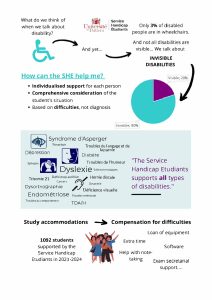
The University of Poitiers welcomed approximately 30 000 students. The student disability service supported 958 students with disabilities during the 2022/2023 year.
To this figure, we must add a certain number of students with disabilities who do not come to the SHE (because they do not need study or exam accommodations, or even support from the service’s professionals).
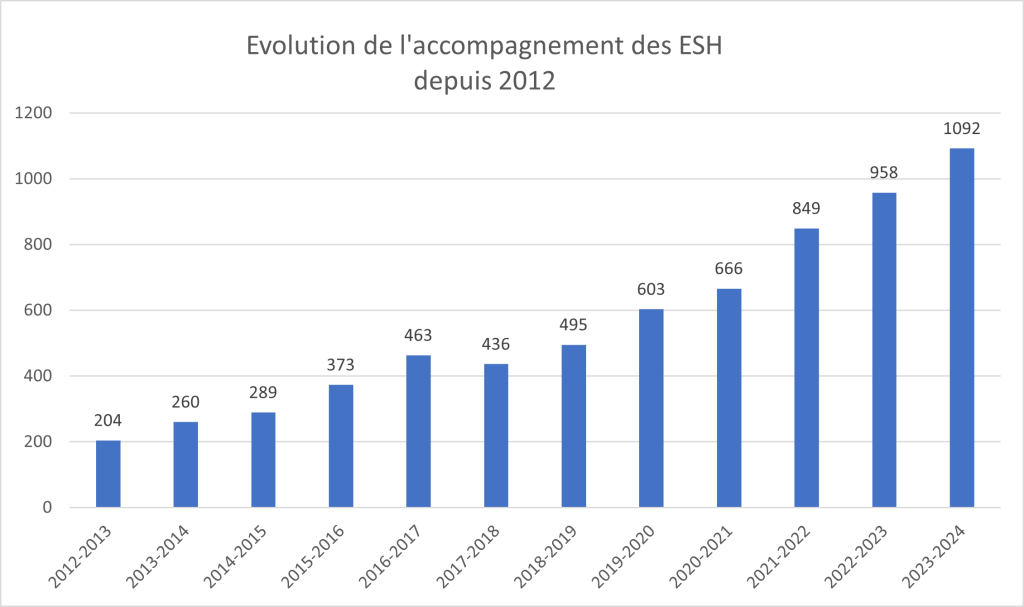
SHA = Humans Sciences ans Arts / Lettres = Literature and Languages / Medecine = Medicine / SFA = Sciences / Droit = Law / Droit Eco = Economic Sciences / INSPE / IUT / FSS = Sports Sciences / IPAG / IAE / IPHD
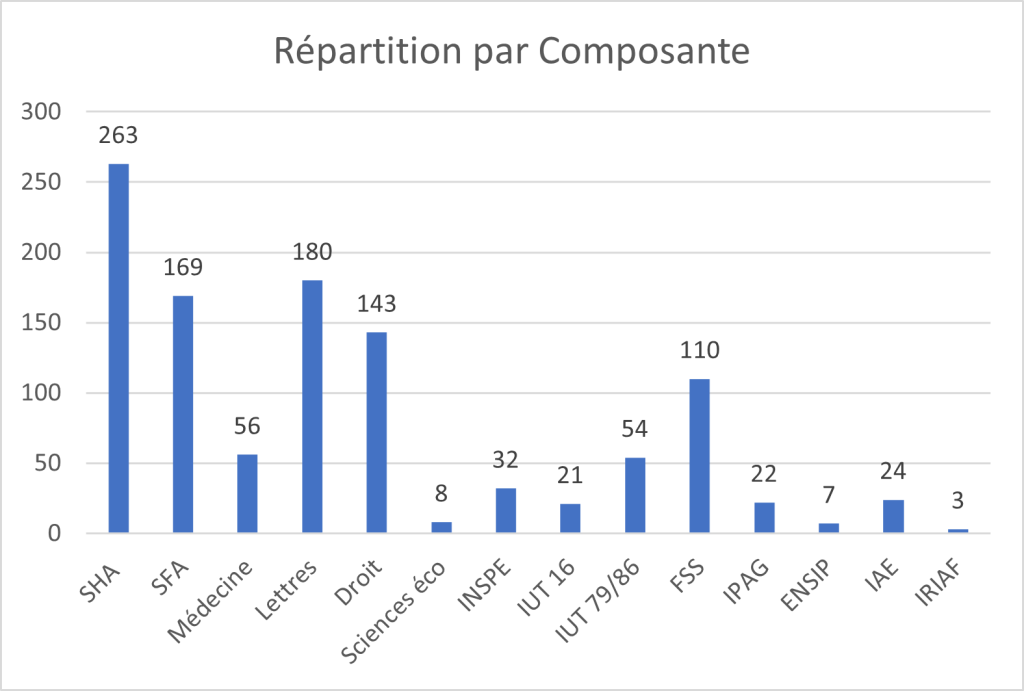
ASD – Visceral – Language disorders – Psychological – Motor – Multiple disorders – Visual – Auditory – Cognitive – Temporary – Others
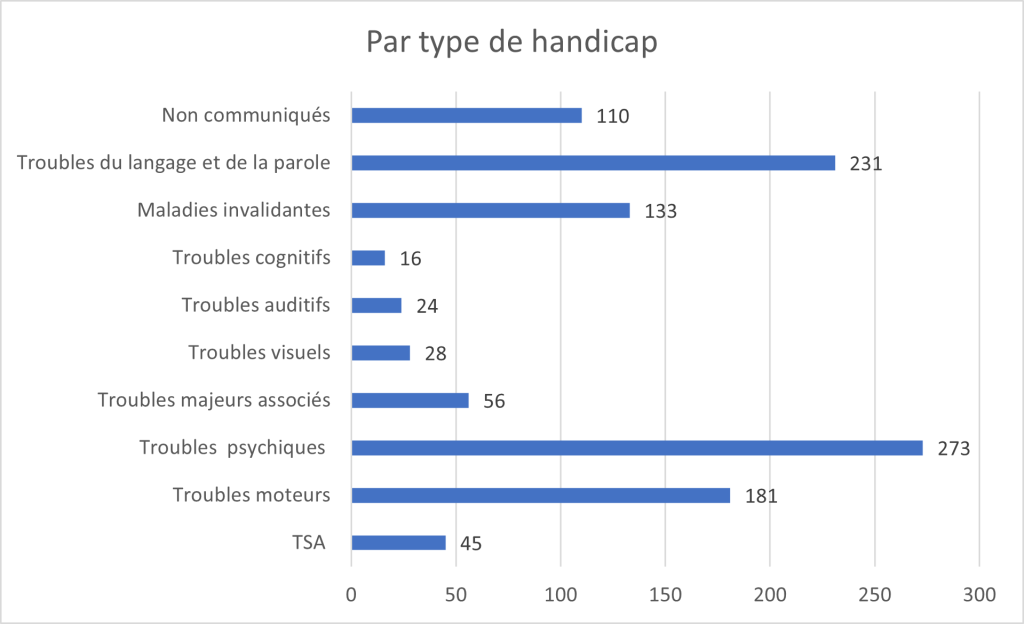
In order to benefit from study or examination arrangements, students must follow the procedure in force at the University of Poitiers.
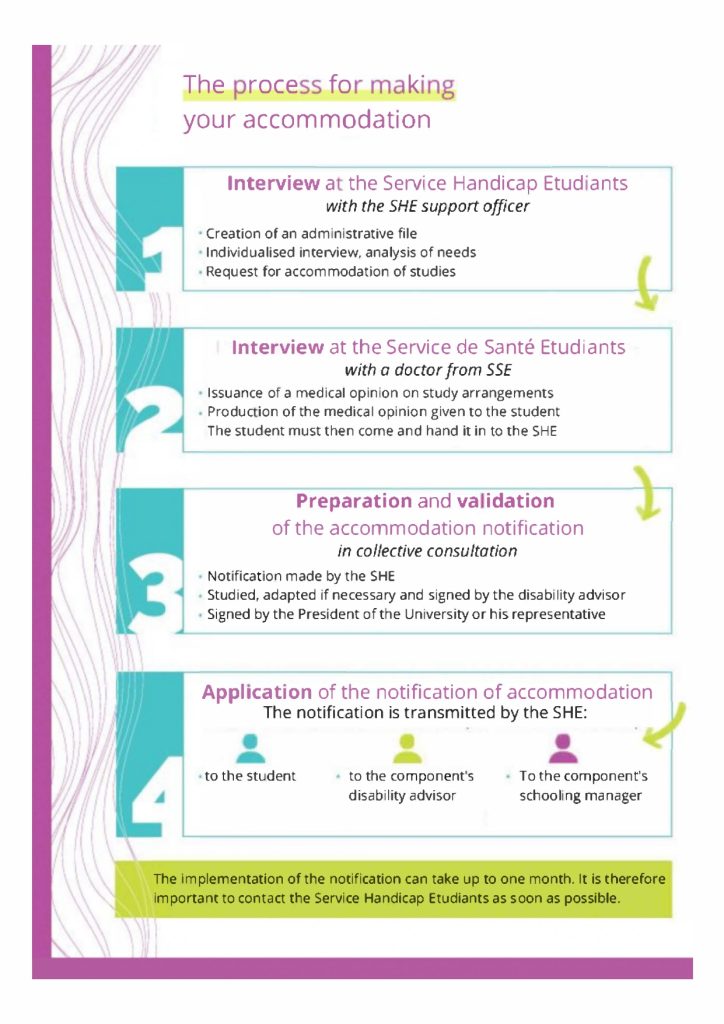
It is also the SHE and the SSE that accompany the students with disabilities to the delocalized sites (Futuroscope, Châtellerault, Niort, Angoulême, Segonzac).
For Niort and Angoulême, these appointments are made by telephone or video. An additional appointment must be scheduled with the site nurse (before the appointment with the SSE)
The detailed procedure:
1. Interview with the disability service: The student must make an appointment with the disability service for an evaluation of his/her difficulties and needs in order to make a request for accommodation. During this first meeting with the support officer, the student discusses the difficulties caused by his or her disability, his or her needs, the accommodations he or she was able to obtain in secondary school, but it is also an opportunity to discuss his or her MDPH recognition, housing, scholarships, etc.
2. Medical visit: the student must make an appointment with a doctor from the students health service (SSE) who will give a medical opinion and recommend study accommodations. A medical certificate is then handed to the student who is responsible for bringing it to the disability service. This step is essential in the procedure. It should be noted that the SSE doctors have been delegated by the CDPAH to make decisions regarding study accommodations in higher education.
3. Preparation and validation of the notification: the student must then wait for the preparation and validation of the accommodation notification. Indeed, it takes time for the disability service (which draws up the document) and the teaching staff (via the disability referents/correspondents) to study, validate and sign the document. The disability officer also signs the document, by delegation from the President of the University. A multidisciplinary meeting may be organised with the teaching staff in the event of difficulties linked to the implementation of the arrangements or in the event of a particular situation of the student.
4. Application of the notification: the notification is sent to the student, but also to the disability advisor and the head of the schooling department of the UFR concerned. The UFR must inform the teaching staff of the arrangements to be made and implemented for courses and examinations. A notification is a document formalising a legal obligation for the University, it is valid for one academic year (or one semester) and must be renewed each year.
Pierre Bessaguet (pierre.bessaguet@univ-poitiers.fr): IRIAF, IPHD, IAE, Law and Social Sciences,FSS, INSPE
Jessica Guillet (jessica.guillet@univ-poitiers.fr): Humanities and Languages, Medicine-Pharmacy
Marie Nantes (marie.nantes@univ-poitiers.fr): Humanities and Arts
Celine Brosse (celine.brosse@univ-poitiers.fr) : ENSIP, IPAG, IUT, Applied Fundamental Sciences, Economic Sciences
Accommodations are individual and correspond to the student’s own situation and difficulties. They are proposed in the light of the disability situation and are therefore personalised.
The aim is to compensate for the situation of disability and the difficulties encountered by the student by means of the adjustments made, while at the same time encouraging the student’s autonomy.
A distinction is made between study accommodations and examination accommodations (this distinction is made on the accommodation notification or the accommodation contract).
Among these arrangements, the SHE offers human assistance (for studies or exams): students are recruited by the service to accompany students with disabilities (they may be paid or provide these missions on a voluntary basis).
Note-taking: passing on course notes in a regular, legible and detailed manner to one or more students in the class
Exam secretary: during a test or final exam, write under the dictation of a student who is unable to do so in a neutral and impartial manner
Tutoring: pedagogical/methodological tutoring according to the student’s needs (review of course concepts, learning of university work methods, etc.)
Document adaptation: formatting course documents so that they can be read by a voice synthesiser and/or printed in Braille.
The SHE has equipment that can be loaned to students with disabilities: computer, microphone, dictaphone, tablet, Braille display…
| If you wish to help students, the SHE recruits students every year for these missions!
Do not hesitate to contact us |
The doctors at the SSE welcome each student who wishes to have their studies adapted during a dedicated and free consultation. The doctor assesses the impact of the disability on student life (stage 2 of the accommodation request procedure).
The doctor draws up a medical certificate which the student must send to the Disabled Students Service. Please note that the certificates can be multi-year certificates (in this case, only the appointment with the SHE needs to be scheduled for the following year).
More generally, the SSE offers consultations and appointments with various professionals: nurses, doctors, midwives, psychologists, social workers.
The main role of the disability correspondent is to establish a link between the disability service and the component (mainly school and teachers)
His/her missions :
If necessary :